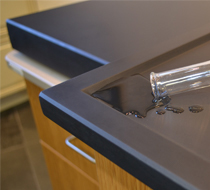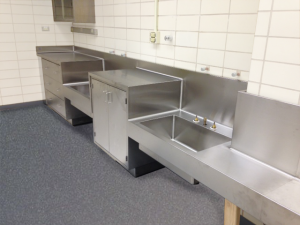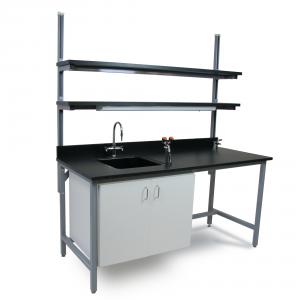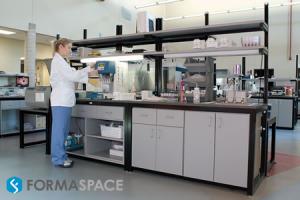Which Chemical Resistant Countertop is Good for Your Lab Project?
Do you know which work surface material is right for your specific experiments or research? See an in-depth Chemical Resistant Countertops Comparison!
Which Countertops are the Toughest?
Two Formaspace countertop options vie for top honors as the toughest: Chemical Resistant Epoxy TopEpoxy Resin countertops and Stainless Steel countertops.
Both are extremely strong, long-lasting and resistant to high temperatures. But the nod in overall toughness goes to Epoxy Resin countertops, thanks to their very high chemical resistance.
While Stainless Steel countertops are resistant to corrosion, they aren’t quite as scratch and dent resistant as Epoxy Resin countertops.
Phenolic Resin countertops come in third for overall toughness making them a good choice for many healthcare applications, HDPE (high-density polyethylene) follows in fourth with Chemical Resistant Laminate Countertops rounding out in fifth. Both HDPE and Chemical Resistant Laminate are recommended for light duty.
Which Formaspace Countertops are the Most Resistant to Corrosive Chemical and Carbon-Based Chemical Spills?
At Formaspace Epoxy Resin countertops come out on top for corrosive chemical spill resistance— better than any of our other countertop materials.
Both Epoxy Resin countertops and Stainless Steel countertops are also particularly well-suited for resisting carbon-based chemical spills. They are also very resistant to high-temperature exposure.
Stainless Steel countertops have the additional advantage that they are easy to clean and non-absorbent; the lack of pores and cracks in the Stainless Steel make it easier to control bacteria on the surface, as well as dirt and grime.
Sitting in the third place, Phenolic Resin countertops are easy to clean and offer moderate chemical resistance as well as moisture resistance. This is a popular choice in medical, clinical and bioscience applications such as work in hematology and urology. Caustic chemicals, however, must be avoided.
HDPE (high-density polyethylene) countertops have unique characteristics. They are resistant to many solvents and generally non-absorbent, making them a good economical choice for use in laboratory environments where the countertops won’t be exposed to caustic chemicals. Typical use examples include marine biology and food and beverage industries. The material is soft compared to other countertop materials and can be used to prevent scratching during product assembly for example. However, HDPE is flammable, so if high heat applications are anticipated it’s important to choose another more durable material.
Finally, in fifth place, Chemical Resistant Laminate Countertops are the least resistant to corrosive chemicals and spills. They are not suited to high-temperature areas. Therefore, their use should be more oriented toward dry chemicals or low-temperature physical science applications.
Which Formaspace Countertops are the Most Environmentally Friendly?
Stainless Steel countertops come out on top for an environmentally friendly material for several reasons. Thanks to its inherent corrosion resistance, Stainless Steel will last for decades and decades with minimal ongoing cleaning and maintenance upkeep. If the installation requires remodeling, the Stainless Steel countertops can usually be successfully detached and moved to new locations, potentially earning you LEED credits for reusing materials. If the day comes that the Stainless Steel cannot be reconfigured to a future use, it is inherently very recyclable without expending much energy.
A runner-up in this category is Epoxy Resin countertops, in part to their extreme toughness and long life. Like Stainless Steel countertops, Epoxy Resin countertops can withstand being disassembled and reconfigured in any potential future remodeling activity. This could grant you LEED environmental credits during a renovation.
Which Formaspace countertops have the quickest fabrication and delivery times?
Chemical Resistant Laminate countertops and HDPE (high-density polyethylene) countertops have the fastest fabrication and delivery times. We keep a variety of Chemical Resistant Laminate countertop material colors in stock assuring quick delivery. We can also provide low-cost customization to meet your requirements.
In third place are Phenolic Resin countertops. These take a bit longer than Chemical Resistant Laminate and HDPE countertops to be fabricated. Formaspace stocks a variety of Phenolic Resin colors and we can special order a color just for you.
Stainless Steel countertops and Epoxy Resin countertops have the longest lead-time for fabrication and installation.
It’s a testament to Epoxy Resin’s inherent toughness that it’s considered very difficult to fabricate the material in the field. It’s generally preferable to machine the Epoxy Resin sink cutouts, faucet holes and utility holes here at the factory. The same goes for machining radius edges and bevels on the countertops and backsplashes.
Finally, because the Epoxy Resin material is very heavy, we recommend only using trained staff experienced in working with this material.
Which Formaspace countertops cost the least in the short run and in the long run?
In the short run, the Chemical Resistant Laminate countertops are the least expensive to purchase — but only from an initial investment view. HDPE (high-density polyethylene) countertops are only slightly more expensive with respect to the initial investment.
Next up are Phenolic Resin countertop materials — these are more expensive to purchase upfront but will provide an exceptionally long life for use in applications in fields like healthcare, including hematology and urology labs, as well as a full range of industrial applications. Extreme durability of Phenolic Resin countertops means that the initial investments can be amortized over many years, providing a much lower total cost of ownership.
Epoxy Resin countertops have a higher upfront cost. However, thanks to their inherent extreme durability, resistance to both corrosive chemicals and carbon-based chemicals as well as resistance to high temperatures, Epoxy Resin countertops are expected to last the lifetime of the facility. Consequently, the cost of ownership for Epoxy Resin countertops can be among the lowest over the long-term.
Read more... formaspace.com/articles/laboratory-furniture/chemical-resistant-countertop-good-lab-project/?utm_source=einpresswire&utm_medium=content&utm_campaign=article-041216
Mehmet Atesoglu
Formaspace
8002511505
email us here
Legal Disclaimer:
EIN Presswire provides this news content "as is" without warranty of any kind. We do not accept any responsibility or liability for the accuracy, content, images, videos, licenses, completeness, legality, or reliability of the information contained in this article. If you have any complaints or copyright issues related to this article, kindly contact the author above.




